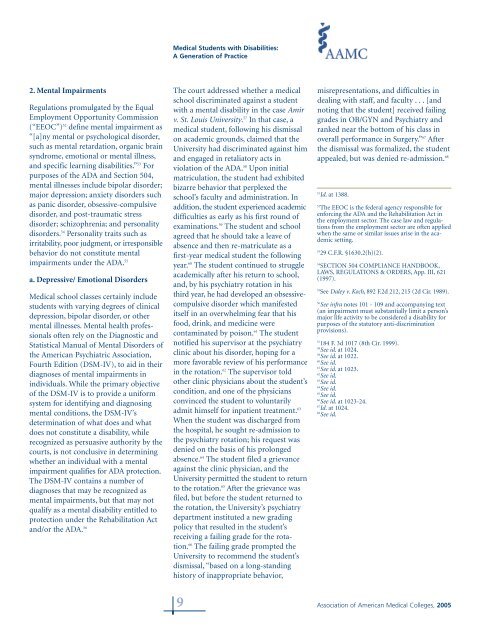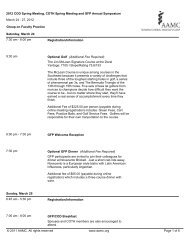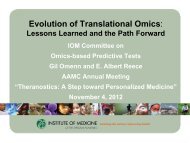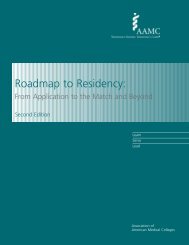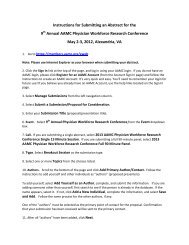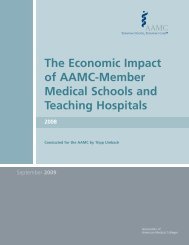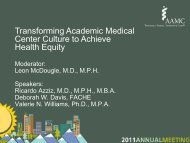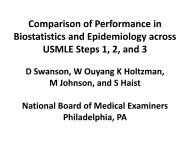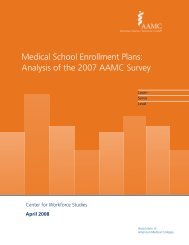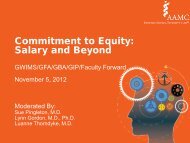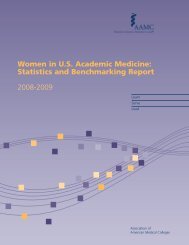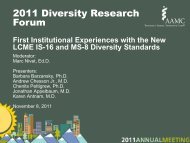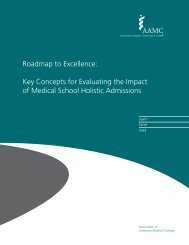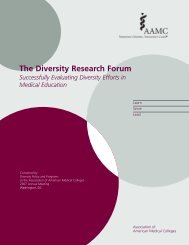Medical Students with Disabilities: A Generation of Practice
Medical Students with Disabilities: A Generation of Practice
Medical Students with Disabilities: A Generation of Practice
You also want an ePaper? Increase the reach of your titles
YUMPU automatically turns print PDFs into web optimized ePapers that Google loves.
<strong>Medical</strong> <strong>Students</strong> <strong>with</strong> <strong>Disabilities</strong>:<br />
A <strong>Generation</strong> <strong>of</strong> <strong>Practice</strong><br />
2. Mental Impairments<br />
Regulations promulgated by the Equal<br />
Employment Opportunity Commission<br />
(“EEOC”) 52 define mental impairment as<br />
“[a]ny mental or psychological disorder,<br />
such as mental retardation, organic brain<br />
syndrome, emotional or mental illness,<br />
and specific learning disabilities.” 53 For<br />
purposes <strong>of</strong> the ADA and Section 504,<br />
mental illnesses include bipolar disorder;<br />
major depression; anxiety disorders such<br />
as panic disorder, obsessive-compulsive<br />
disorder, and post-traumatic stress<br />
disorder; schizophrenia; and personality<br />
disorders. 54 Personality traits such as<br />
irritability, poor judgment, or irresponsible<br />
behavior do not constitute mental<br />
impairments under the ADA. 55<br />
a. Depressive/ Emotional Disorders<br />
<strong>Medical</strong> school classes certainly include<br />
students <strong>with</strong> varying degrees <strong>of</strong> clinical<br />
depression, bipolar disorder, or other<br />
mental illnesses. Mental health pr<strong>of</strong>essionals<br />
<strong>of</strong>ten rely on the Diagnostic and<br />
Statistical Manual <strong>of</strong> Mental Disorders <strong>of</strong><br />
the American Psychiatric Association,<br />
Fourth Edition (DSM-IV), to aid in their<br />
diagnoses <strong>of</strong> mental impairments in<br />
individuals. While the primary objective<br />
<strong>of</strong> the DSM-IV is to provide a uniform<br />
system for identifying and diagnosing<br />
mental conditions, the DSM-IV’s<br />
determination <strong>of</strong> what does and what<br />
does not constitute a disability, while<br />
recognized as persuasive authority by the<br />
courts, is not conclusive in determining<br />
whether an individual <strong>with</strong> a mental<br />
impairment qualifies for ADA protection.<br />
The DSM-IV contains a number <strong>of</strong><br />
diagnoses that may be recognized as<br />
mental impairments, but that may not<br />
qualify as a mental disability entitled to<br />
protection under the Rehabilitation Act<br />
and/or the ADA. 56<br />
The court addressed whether a medical<br />
school discriminated against a student<br />
<strong>with</strong> a mental disability in the case Amir<br />
v. St. Louis University. 57 In that case, a<br />
medical student, following his dismissal<br />
on academic grounds, claimed that the<br />
University had discriminated against him<br />
and engaged in retaliatory acts in<br />
violation <strong>of</strong> the ADA. 58 Upon initial<br />
matriculation, the student had exhibited<br />
bizarre behavior that perplexed the<br />
school’s faculty and administration. In<br />
addition, the student experienced academic<br />
difficulties as early as his first round <strong>of</strong><br />
examinations. 59 The student and school<br />
agreed that he should take a leave <strong>of</strong><br />
absence and then re-matriculate as a<br />
first-year medical student the following<br />
year. 60 The student continued to struggle<br />
academically after his return to school,<br />
and, by his psychiatry rotation in his<br />
third year, he had developed an obsessivecompulsive<br />
disorder which manifested<br />
itself in an overwhelming fear that his<br />
food, drink, and medicine were<br />
contaminated by poison. 61 The student<br />
notified his supervisor at the psychiatry<br />
clinic about his disorder, hoping for a<br />
more favorable review <strong>of</strong> his performance<br />
in the rotation. 62 The supervisor told<br />
other clinic physicians about the student’s<br />
condition, and one <strong>of</strong> the physicians<br />
convinced the student to voluntarily<br />
admit himself for inpatient treatment. 63<br />
When the student was discharged from<br />
the hospital, he sought re-admission to<br />
the psychiatry rotation; his request was<br />
denied on the basis <strong>of</strong> his prolonged<br />
absence. 64 The student filed a grievance<br />
against the clinic physician, and the<br />
University permitted the student to return<br />
to the rotation. 65 After the grievance was<br />
filed, but before the student returned to<br />
the rotation, the University’s psychiatry<br />
department instituted a new grading<br />
policy that resulted in the student’s<br />
receiving a failing grade for the rotation.<br />
66 The failing grade prompted the<br />
University to recommend the student’s<br />
dismissal, “based on a long-standing<br />
history <strong>of</strong> inappropriate behavior,<br />
misrepresentations, and difficulties in<br />
dealing <strong>with</strong> staff, and faculty . . . [and<br />
noting that the student] received failing<br />
grades in OB/GYN and Psychiatry and<br />
ranked near the bottom <strong>of</strong> his class in<br />
overall performance in Surgery.” 67 After<br />
the dismissal was formalized, the student<br />
appealed, but was denied re-admission. 68<br />
51<br />
Id. at 1388.<br />
52<br />
The EEOC is the federal agency responsible for<br />
enforcing the ADA and the Rehabilitation Act in<br />
the employment sector. The case law and regulations<br />
from the employment sector are <strong>of</strong>ten applied<br />
when the same or similar issues arise in the academic<br />
setting.<br />
53<br />
29 C.F.R. §1630.2(h)(2).<br />
54<br />
SECTION 504 COMPLIANCE HANDBOOK,<br />
LAWS, REGULATIONS & ORDERS, App. III, 621<br />
(1997).<br />
55<br />
See Daley v. Koch, 892 F.2d 212, 215 (2d Cir. 1989).<br />
56<br />
See infra notes 101 - 109 and accompanying text<br />
(an impairment must substantially limit a person’s<br />
major life activity to be considered a disability for<br />
purposes <strong>of</strong> the statutory anti-discrimination<br />
provisions).<br />
57<br />
184 F. 3d 1017 (8th Cir. 1999).<br />
58<br />
See id. at 1024.<br />
59<br />
See id. at 1022.<br />
60<br />
See id.<br />
61<br />
See id. at 1023.<br />
62<br />
See id.<br />
63<br />
See id.<br />
64<br />
See id.<br />
65<br />
See id.<br />
66<br />
See id. at 1023-24.<br />
67<br />
Id. at 1024.<br />
68<br />
See id.<br />
9 Association <strong>of</strong> American <strong>Medical</strong> Colleges, 2005


